|
Enter content here
The latest models of leading auto manufacturers are on display at the traditional Autoexpo 2002 in Varna's Palace of Sports and Culture. BTA photo by Krassimir Krustev
Police armored personnel carriers on the outskirts of Skopje wait to move towards the village of Zerovjane, on the road between Tetovo and Gostivar, some 50 kms (30 miles) west of Skopje, Friday, Aug 30, 2002. Unidentified gunmen stopped a bus and abducted five people near village of Zerovjane in western Macedonia late Thursday, as hundreds of ethnic Albanians blocked the main road in the region, further escalating tensions in the violent Balkan country. The police blocked roads and villages in the region on Friday. (AP Photo/Boris Grdanoski)
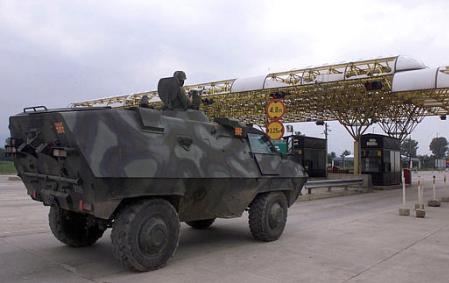 A police armored personnel carrier patrols on the road between Tetovo and Gostivar, towards the village of Zerovjane, some 50 kms (30 miles) west of Skopje, Friday, Aug 30, 2002. Unidentified gunmen stopped a bus and abducted five people near the village of Zerovjane in western Macedonia late Thursday, as hundreds of ethnic Albanians blocked the main road in the region, further escalating tensions in the violent Balkan country. The police blocked roads and villages in the region on Friday. (AP Photo/Boris Grdanoski)
A Macedonian special police on an APC moves towards the village of Zerovjane some 70 km (approx. 43 miles) west of Macedonian capital on August 30, 2002. Macedonia was poised on the brink of renewed conflict on Friday as heavily armed police sealed off an ethnic Albanian village where five Macedonians kidnapped by ethnic Albanian gunmen were apparently being held. (MACEDONIA OUT) REUTERS/Ognen Teofilovski
Macedonian special police wait on their armored personnel carriers (APC) in Skopje to move towards village of Zerovjane some 70 km (43 miles) west of Macedonian capital on August 30, 2002. Macedonia was poised on the brink of renewed conflict on Friday as heavily armed police sealed off an ethnic Albanian village where five Macedonians kidnapped by ethnic Albanian gunmen were apparently being held. REUTERS/Ognen Teofilovski
"Known Persons" Kidnap Seven Macedonians on Tetovo-Gostivar Highway.
Makfax
Seven persons, ethnic Macedonian citizens of Republic of Macedonia, had been kidnapped last night on Tetovo-Gostivar highway, near the village of Zherovjane, said Makfax news agency, referring to police sources.
Police sources surmise the Macedonians had been kidnapped by a group of criminals already known to police.
The incident took place last night about 21:00 on Tetovo-Gostivar highway near the village of Zherovjane, shortly after a two-hour roadblock was removed. The roadblocks were set up by local residents demanding a release of two Albanian detainees.
Dead Body Found On Tetovo-Gostivar Highway.
Makfax
A dead body of unidentified male was brought to Medical Center in Tetovo shortly before daybreak Friday (about 4:30 hrs).
The body (age 30 to 40) was found near Tetovo-Gostivar highway, in the area between the villages of Zerovjane and Kamenjane.
Two Residents Of Gostivar Kidnapped.
Makfax
Two residents of Gostivar were kidnapped last night on Tetovo-Gostivar highway, near the road section to Zerovljane. Police sources say the kidnapped persons are Boban Jankovski and Sergej Filipovski, both of Macedonian nationality.
They were on board the bus Zhas Bus that headed to Gostivar Thursday at 18:00 p.m. from Skopje. A group of armed persons had perpetrated the kidnapping.
Roadblocks have been set up on Tetovo-Gostivar highway by the local residents earlier today.
NATO's Lord Robertson Deplores The Kidnappings.
NATO
Statement By The NATO Secretary General Lord Robertson.
The recent kidnapping of a group of citizens in the former Yugoslav Republic of Macedonia (Turkey recognizes the Republic of Macedonia with its constitutional name [Republic of Macedonia]) is a deplorable act of violence that undermines the efforts of all those who are working for long-term stability in the country. Provocations must stop. I urge the perpetrators to release the victims immediately and unconditionally. I call on the population to remain calm and resist any calls for retaliation and appeal for restraint from the authorities.
The citizens of the former Yugoslav Republic of Macedonia have on 15 September an historic opportunity to keep their country firmly on the path to European integration. I am confident that their democratic representatives will continue to take the right decisions to ensure a positive outcome by conducting free and fair elections.
However, the country's democratic future can only be firmly secured if agreements are respected in a spirit of compromise and reconciliation by all those who signed up to them. Agreements cannot be embraced when convenient and discarded when not. Voters should be convinced and persuaded by logical arguments and not the abuse of power. Intimidation and harassment, limitations to freedom of movement and roadblocks are not commensurate with the concept of free and fair elections.
A year ago, I congratulated the Parliament of the former Yugoslav Republic of Macedonia for taking the historic decision to proceed with constitutional reforms, as set out in the Ohrid Agreement, to restore peace and stability to their country.
With that vote, the democratically-elected representatives of the people of the former Yugoslav Republic of Macedonia brought the country back from the brink of bloody civil war and closer to the European family of nations. The constitutional changes established the basis for a new era of mutual trust between all communities and created the opportunity to build a peaceful, multi-ethnic democracy.
Since then the search for compromises on difficult and divisive issues has taken place through the right and legitimate channel, the country's democratic institutions. This has been a major achievement. The forthcoming Parliamentary elections, on 15 September, will be the next important step in this process.
Against this background, I strongly condemn the increase in violence in recent weeks. My thoughts in particular are with the families of the two policemen killed last week-end, to whom I offer my condolences. No political agenda can justify these criminal acts.
Gunmen seize hostages along main route in western Macedonia.
By KONSTANTIN TESTORIDES, Associated Press Writer
SKOPJE, Macedonia - Unidentified gunmen have stopped a bus and abducted several people in western Macedonia, as hundreds of ethnic Albanians blocked a key road in the region, further escalating tensions in the volatile Balkan country, the government said Friday.
The assailants stopped the bus Thursday night just outside the town of Gostivar, 60 kilometers (40 miles) west of the capital, Skopje, Vojislav Zafirovski, an Interior Ministry spokesman, told the state-run MIA news agency.
"Five people were abducted and police are doing everything possible to rescue the hostages and arrest the kidnappers," Zafirovski said.
Gunmen first kidnapped eight people, but then apparently released three of them, including two ethnic Albanians and one Macedonian Slav, according to a NATO official who spoke on condition of anonymity.
The NATO official said he was told by the Interior Ministry that the gunmen threatened to execute their hostages, all Macedonian Slavs, unless three Albanians arrested in connection with the recent slaying of two Macedonian policemen are released.
In a joint statement, the European Union, the United States and NATO strongly condemned "the hostage taking of five persons ... on the Tetovo-Gostivar highway."
"We demand their immediate release. We welcome the assurance of the authorities to do their utmost to safeguard the lives of the hostages and to refrain from any action that can lead to further escalation of this situation," said the statement issued by EU representative to Macedonia Alain LeRoy, U.S. Ambassador Lawrence Butler, NATO Ambassador Nicolaas Biegman and another diplomat.
The European Union's Monitoring Mission supported by NATO forces were present in the region to observe the situation, the statement said.
Meanwhile, for the second consecutive day, angry ethnic Albanians seeking the release of the three arrested were blocking a main road just outside Gostivar.
Tensions rose sharply after authorities earlier this week issued an arrest warrant against three ethnic Albanians, including former rebel leader Ali Ahmeti, who is a candidate in parliamentary elections scheduled for Sept. 15.
Fearing an outbreak of violence, NATO has warned Macedonian authorities against arresting Ahmeti or other officials of his party, but Macedonian state prosecutor Stavre Dzikov said the warrant must be carried out.
The September ballot will be the first since the ethnic Albanian rebels launched an insurgency in February last year, saying they were fighting for more rights for their ethnic group, almost a third of the country's 2 million people.
The conflict ended in August 2001 with a Western-brokered peace agreement. As part of the deal, the insurgents surrendered their weapons to NATO troops and disbanded, although a number of splinter groups remain.
In exchange, the Macedonian parliament amended the constitution and enacted laws granting ethnic Albanians more rights, including an amnesty for former rebels and greater political influence for their minority.
Expressing concern over the new tensions, the government of neighboring Albania on Friday urged Macedonia to show restraint ahead of the elections, warning the arrest of Ahmeti and other "extremist actions" would renew ethnic violence.
A press statement released by the Foreign Ministry in Tirana also denounced the "creation of an atmosphere of uncertainty among the (Macedonian) electorate," citing the recent killing of two Macedonian policemen and bomb attacks against offices of ethnic Albanian political parties in Macedonia.
Macedonia Primes Force for Possible Action.
Reuters
SKOPJE (Reuters) - A convoy of heavily armed Macedonian special police and armored vehicles formed up outside the capital Skopje on Friday following reports that five Macedonians had been kidnapped by ethnic Albanian gunmen.
A Reuters reporter saw several hundred police in trucks accompanied by seven tracked armored personnel carriers and seven lighter armored vehicles on the road leading to the ethnic Albanian cities of Tetovo and Gostivar.
Police said earlier that ethnic Albanians had taken Macedonian civilians hostage and were threatening to kill them if Albanians held for the murder of two policemen this week were not freed. They set a deadline which passed on Friday morning.
Western powers which brokered an end to the ethnic Albanian guerrilla insurgency in Macedonia last year fear renewed violence in the run-up to a general election due in two weeks.
Macedonians Abducted, Troops Mass in Capital.
Reuters
SKOPJE (Reuters) - A convoy of heavily armed Macedonian special police and armored vehicles formed up outside the capital, Skopje, on Friday following reports that five Macedonians had been kidnapped by ethnic Albanian gunmen.
A Reuters reporter saw several hundred police in trucks accompanied by seven tracked armored personnel carriers and seven lighter armored vehicles on the road leading to the ethnic Albanian cities of Tetovo and Gostivar.
Western powers who brokered a peace in Macedonia last year have said they fear a resurgence of violence in the runup to a general election scheduled for September 15.
Police said earlier that ethnic Albanians in western Macedonia had taken Macedonian civilians hostage and were threatening to kill them if Albanians held for the murder of two policemen this week are not freed.
The unidentified kidnappers said they would kill the hostages -- believed to number five -- if their demands were not met by a 10 a.m. local time Friday deadline, a senior police source in Tetovo said.
Police said seven civilians were taken late on Thursday from a bus traveling on the Tetovo-to-Gostivar highway, in the predominantly ethnic Albanian west of Macedonia. According to sources with the NATO peacekeeping force in Macedonia, two hostages were subsequently released.
The highway had now been sealed off and police special forces were moving into the area, police said.
The abduction followed several incidents earlier this week, including Monday's drive-by machinegun murder of two policemen, that have raised Western fears of renewed violence in the run-up to a general election in two weeks.
Macedonia narrowly escaped an all-out ethnic civil war last year when an ethnic Albanian guerrilla army seized territory.
The election is a key plank in the Western-brokered peace pact that ended last year's fighting. Former guerrilla leader Ali Ahmeti is running in the campaign as leader of an ethnic Albanian party formed after the rebels agreed to disarm.
Macedonia gunmen seize hostages.
BBC
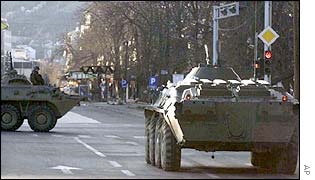
A heavily armed convoy has moved into the area.
Gunmen in Macedonia have threatened to kill a number of hostages seized on a highway outside the north-western town of Debar. Up to seven people were captured near the village of Zerovjane by former members of the officially disbanded National Liberation Army (NLA), an ethnic-Albanian guerrilla group involved in an insurrection last year.
Two people were reportedly freed overnight, but at least four are thought to still being held, including a senior official from Macedonia's state bank. The kidnappers had said they would kill their prisoners unless their demands were met by a 1000 local time (0800 GMT) on Friday, a senior police source in Tetovo said. But the deadline passed without any indication that the hostages had been executed.
Militants arrested.
The gunmen are demanding the release of two former fellow militants arrested on Thursday for the murder of two policemen. They accuse the government of breaching an agreement, reached last year, that gave former guerrilla fighters an amnesty for taking part in the war.
Reuters news agency reports that a heavily-armed special police convoy is moving into the area. Seven armoured personnel carriers and several hundred police in trucks were seen driving out of the capital, Skopje.
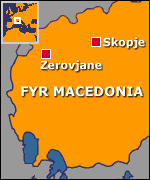
Tension building.
The standoff comes during an increasingly tense build-up to parliamentary elections in the country, in two weeks' time. The past two weeks have seen the government step up security measures in the former conflict zones.
Last Monday, two volunteer policemen were shot dead, allegedly by ethnic Albanian gunmen. Senior ministers are now threatening to arrest the former commander of the NLA, Ali Ahmeti, now a leading candidate in the upcoming polls.
NATO mandate in Macedonia could be prolonged.
EU OBSERVER
Written by Lisbeth Kirk
Edited by Honor Mahony
The presence of NATO troopers in Macedonia may be prolonged again, European High representative, Javier Solana, signalled in a press conference held at the Elsinore foreign ministers meeting on Friday.
A solution for the deployment of EU peacekeepers to the Former Yugoslav Republic of Macedonia has not yet been found. Mr Solana said he could not rule out that NATO countries stay in the area until "late November or the end of the year".
Deployment of the European Rapid Reaction Force has been delayed by both Greek and Turkish concerns. An agreement is necessary for the EU to use NATO military assets in its operations, particularly with the prospect of a take-over of the Amber Fox mission in Macedonia, which ends 26 October 2002.
How to Take Down a Government, Part Five.
Antiwar.com
by Christopher Deliso in Skopje
Fallout and Predictions.
The present series has documented a clear and coordinated campaign by Western, and mainly American, interventionists to influence Macedonia's September 15th elections. As we have seen, this campaign has been executed through political pressure, economic coercion, media propaganda, and especially through the publications of Edward Joseph and the ICG.
From this evidence, it seems clear that the US is looking to depose Prime Minister Ljupco Georgievski and his allegedly nationalistic party, VMRO-DPMNE, and replace them with a coalition of the Socialist SDSM and former Albanian warlord Ali Ahmeti. The operative motive seems to be the perceived pliability of the opposition. SDSM and Ahmeti have been far more ameliatory to the US and its goals, specifically in terms of implementing the Framework Agreement. The obstinate VMRO, on the other hand, has long been perceived by the internationals as a prickly pear.
Briefly, we should incorporate the recent developments that may affect the proceedings, and make some predictions.
VMRO's Folly.
I am well aware that the ruling party is making full use of the present reports, by translating them in the local media (Antiwar.com's reprint policy, alas, does not extend to "rogue states" like Macedonia). Yet my intention was not to support their side, nor was it to disparage the opposition. As an American citizen, I am not concerned with the machinations of the parties here. I am merely concerned with the interventionist effect that my people have on foreign countries, like Macedonia. My articles appear to support the ruling party, therefore, in direct proportion to how the interventionists appear to be supporting the opposition. It is none of my business to tell the Macedonians how to vote. Neither is it the business of interventionist figures and institutions.
In my opinion, one of the reasons why SDSM is being wooed is that they are simply smoother than VMRO. They have better PR, their leaders do not make conflagratory statements, and they are in general a slicker bunch. Since this is how business is done in the West, it comes as no surprise that the interventionists would support the party that knows how to "play ball."
VMRO, on the other hand, has chronically failed in its public relations efforts.
Under its administration, the government has killed its credibility through sensationalism, factual misrepresentation, and a reliance on quite see-through rhetoric. Its most serious failure was in not enlisting a PR company- though one American firm did make a substantial offer- during last year's war. Many Macedonians agree with what I have argued repeatedly: the war was lost largely because of a lack of public relations and the Western media's negative depiction of Macedonians.
In its desire to win through all means possible, it appears that VMRO has latched on to a rather unfortunate mouthpiece- Manifest, the new publication of Lyndon LaRouche in Macedonia. Although it would be an exaggeration to say that Manifest has taken Skopje by storm, a recent attack on George Soros actually prompted the NGO's to host a comic photo op yesterday in a local café: it was called "Meet the 5th column."
Now, it's a free country and all, and LaRouche has every right to disseminate his views. But by promoting the views of a thinker who has utterly no credibility in the West, VMRO not only endangers itself- it also insults the intelligence of its citizens. The relationship is especially harmful because the LaRouchies often criticize the same things as we do (NGO tyranny, Western intervention etc.), but for much different and more speculative reasons, ones which are ultimately supported by a rather solipsistic and untenable base of presuppositions. By pushing such a perspective, VMRO proceeds at its own peril.
Ahmeti's Future and the Albanian Parties.
There are many who believe that Ali Ahmeti will benefit from his populist support base and win several parliamentary seats for his party. There are also many who believe that he will not live to see the party's victory.
"Ali Ahmeti is living on borrowed time," states one Western observer in Skopje. "If he becomes a threat to Xhaferi, he will be taken out."
The truth of the matter is that Ahmeti is not a seasoned politician, and he is actively challenging the established, well-connected veterans of the Albanian political scene. Short of starting a war against the DPA, he has little chance of success- unless he is backed by the US.
The Americans, however, are wary. Nobody likes a loser, and the US is waiting to see what will happen. If Ahmeti loses his current prestige, the US could easily dump its young protégé- who does, after all, remain on the terrorist blacklist. Otherwise, the US could just wait for independent measures to take effect. In an ominous development, a mysterious bomb exploded near Ahmeti's headquarters yesterday.
As for the DPA, the party has lately been posing as "radicals," in order to show that they are "more Albanian" than Ahmeti. The wholesale defection to DPA of many of Ahmeti's commanders, including the notorious Leka, shows that this campaign has been working. The recent drive-by murder of two Macedonian policemen in Gostivar may well be part of this campaign. Western critics of VMRO have long stated the party's potential for election violence.
Yet they have ignored a perhaps greater danger of violence from the DPA. In fact, the West has been curiously silent about DPA extremism. At a NATO press conference in July, the question was raised about a recent comment from Menduh Thaci. Apparently, the DPA vice-president said something to the effect of "who needs the elections? Just give us the Greater Albania now!"
Hearing of this, EU Spokesperson Irina Guzelova expressed surprise, and feigned ignorance of the comment. Guzelova then said, "inevitably, as the elections near, knives will be brought out, and sharpened but we can't imagine that DPA would not want to participate in the democratic process."
The West's see-no-evil, hear-no-evil policy towards Albanian aggression is confusing. Do the interventionists simply believe that it can be best managed if ignored? Are they afraid of the consequences of cracking down? Or do they have some other use for such intransigence?
As with everything else here, it simply remains to be seen.
Edward Joseph: A Double Agent?
Conspiracy theories die hard in Macedonia. The best one I have heard comes from a seasoned local journalist. Since it runs in direct contravention of the evidence, it is quite interesting to mention- even just to play the part of devil's advocate. The argument goes like this:
"I believe that the US and Edward Joseph are really supporting VMRO. Why? Look at the last few years. Although he has made public protests and spouted anti-Western rhetoric, Georgievski has always in the end done what the West wanted. He gave up the Ukrainian helicopters, he signed the Ohrid Agreement, changed the constitution, and basically conceded to every demand. They allow him to lash out against the West so that he can score points with voters, but in the end he is on their side."
This theory brings up the amusing- and quite unbelievable- thought that Edward Joseph made the most noble sacrifice in his ICG report: that is to say, he sacrificed every shred of respectability by issuing an insipid analysis, laced with errors and obviously biased, in order to cause an upsurge of anti-Western feeling that would directly benefit Georgievski. But unless Joseph is one superb actor, and utterly selfless, this theory cannot be supported: it contravenes every shred of documented evidence. Not being privy to intelligence documents or the machinations of high-level officials, I cannot agree with this theory- though the idea of Edward Joseph secretly being a double agent is perhaps even more entertaining than Austin Powers III.
Reaping the Fruits of Victory: Potential Rewards Under the New Government.
Abandoning such an idea, it seems that Edward Joseph and Co. are indeed ready to benefit from their support of the potential new government. If SDSM wins, all of the key ministers and many of the state officials will be changed.
This will mean that many of Joseph's new-found allies and source witnesses will be returned to the positions of power they lost four years ago. This is similar to what happens after every election in the US- the only difference being that there is no Macedonian agent of unrest in Washington preparing to reap the fruits of his efforts.
Will Joseph stay or not? This is the burning question in Skopje. At his 14 August press conference, he stated that he would remain in Macedonia at least until the end of the year, when his contract expires. He could renew it after that, and sources close to Joseph indicate that (as of August 14th, at least) he planned to do so. Whether or not he will stay now is an open question. Should SDSM somehow lose, and Ali Ahmeti be assassinated, Joseph will be left with no supporters in the country, either Macedonian or Western. It is hard to imagine him remaining under such conditions.
As for his local associates, we have already mentioned the high stakes involved. All of the SDSM-affiliated individuals (like Forum's Saso Ordanovski) stand to gain or regain authoritative positions. But as we have said, an SDSM loss could have unhappy results- perhaps even the closure of A1, Macedonia's most popular (and anti-VMRO) television station.
It remains to be seen how things will pan out. Suffice it to say that a lot of people have much riding on these elections- in terms of careers, special perks, favors and, of course, the chance to enjoy new forms of corruption.
Conclusions.
It seems that September 15th will see just another election in Macedonia, one riven by the same hatreds, operating along the same principles, and marred by the same external intervention as always. While there will undoubtedly be a winner and a loser, the big loser will be the Macedonians themselves. By trying to manipulate foreign intervention against their enemies, they are in fact being manipulated by more powerful forces than their own. In the past few years, Macedonia has given up almost entirely to colonization: the investment colonization of the Greeks, the financial colonization of the IMF and World Bank; the intellectual colonization of the liberal West, the military colonization of NATO and, most importantly, the ongoing territorial colonization of the Albanians.
This situation reminds me very much of Byzantium in the 14th century. At a time when the empire was relegated basically to the environs of Constantinople and a few rocky outposts, at a time when the Ottoman Turks were gazing hungrily upon their desired prize, at a time when both economy and sea travel depended almost entirely on the whims of the colonizing Venetians, the fractious Byzantines succumbed to a destructive 50 year civil war and a needless schism within their own church. By the time they realized the need for unity, it was too late: in 1453, Byzantium was soon destroyed by the expansionist Turks.
To be sure, there are many differences between the two situations. Yet the underlying point remains: as with Byzantium, Macedonia is in mortal danger, but disunited. Its citizens continue to find ways of inciting inter-Macedonian hatreds and disunity, continue to seduce destructive interventionist powers, even as predatory forces crouch, poised for the kill. Now, 550 years after the fall of Constantinople, will the recalcitrant Macedonians invite the same disastrous fate?
Bulgaria Offers Three Airports in Case of Strike against Iraq.
Standartnews
The cabinet considers Bulgaria's response if the USA ask for support.
Three Bulgarian airports could be given to the USA in case of waging war against Iraq if Washington asks for logistical support and the National Assembly passes a political decision, sources from the Defense Ministry said for "Standart". Bulgaria considers the option to take part in a possible US operation, though for now, no inquiry has been made, Defense Minister Nikolay Svinarov said as early as a week ago. Experts are flat that Bulgaria will hardly refuse to participate in the operation because of the invitation to NATO expected to be extended in Prague this fall. To top military officers, the air base in Graf Ignatievo and the airport in Sarafovo are sure to be given to the USA as being adapted for NATO fighters. Though closed down, the air base in Balchik could also be used for the purpose.
RELIEF SUPPLIES - CZECH REPUBLIC.
BTA
Relief Supplies Transported to Czech Republic.
Bourgas, on the Black Sea, August 30 (BTA) - The first batch of Bulgarian relief supplies for disaster areas in the Czech Republic will be transported in an aircraft due to take off from Bourgas Airport at 11.40pm local time August 30, the Regional Government said in a press release.
The central governmental commission on disaster response made the relevant decision on August 26.
The batch consists of 6.5 t of washing detergent worth 6,800 leva (equivalent to 3,480 euros). It will be transported in a Boeing 737-400 of a privately-owned Czech air carrier.
The next shipment will be transported on September 6.
BULGARIA - MISSILES - DESTRUCTION.
BTA
US State Department Proposes Mixed Method for Destruction of SS-23 Missiles.
Sofia, August 30 (BTA) - A new method for destruction of the engines of the SS-23 missile systems has been proposed by officials of the US State Department Bureau of Nonproliferation at a meeting with Bulgarian Defence Minister Nikolai Svinarov, he told journalists on Friday.
"The method is mixed and combines methods used in other countries where SS-23 have been destroyed," Svinarov said. The US Ambassador in Sofia James Pardew was also present at the meeting.
According to the Defence Minister, the new method is safe and will guarantee verification by October 30 and safety. He did not specify what exactly the proposed destruction method involves but noted that it is neither controlled explosion nor controlled incineration. "I am sure that the memorandum naming CDI as the contractor and the agreement between the Defence Ministry and the company will be honoured," Svinarov said.
Replying to question, he said that the new method does not belong to the off-testing-range methods that have been considered so far. If this method is applied, the engines will be eliminated in Bulgaria.
The new method will be discussed by the intergovernmental working group, Svinarov said. He expects to present it to the Environment and Water Ministry and to the general public next week. "The missiles will be demilitarized by October 30, and destruction of part of the missile components will probably continue after that date," the Minister said.
Destruction of the missile system components can start after September 10 at the Zmeyovo Range, Svinarov said. Transportation is expected to start next week.
Gold Thracian Jewellery Discovered.
Standartnews
during the excavations near the village of Pet Mogili (Five Tells) in Shoumen region. The team of archaeologists headed by Georgi Atanasov from the regional Historic Museum in Shoumen found a grave of a noble Thracian woman from 2 AD. The gold ear-rings the woman had been buried with were found extremely valuable.
With Tobacco Capital Bulgartabac Is Lost.
INTERVIEW Standartnews: Agustin Zalduegui
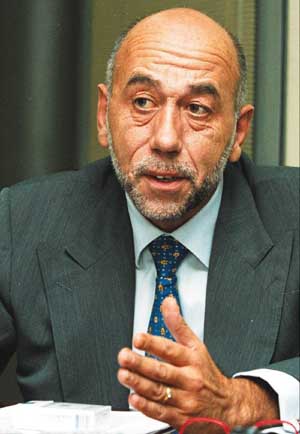
Daniela Kazandzhieva
Evgenija Angelova
I asked four times for an appointment with the vice-premier, but he declined, says Agustin Zalduegui.
Agustin Zalduegui is the CEO of the Vienna-based Tobacco Holding, comprising ITF, Michaelidis, Raiffeisen Investment and Inveco. The company ranked 2nd in the bidding for Bulgartabac. Agustin Zalduegui is working for a decade in the tobacco business. He took part in the privatization of the tobacco monopolies in Azerbaijan and Belarus. He ran programs of market development in Bulgaria and some other countries in East Europe. M.A. in foreign trade and economic and business administration.
- Mr. Zalduegui, have there been any irregularities in the privatization of Bulgartabac?
- Yes, there have been. The rules dictate that money meant for investments should be transparent and clean. However, it doesn't apply to the preferred buyer. Tobacco Capital are the people who have nothing to do with the branch and they will not bring it anywhere. The problem is that Bulgartabac goes along with them.
- Tobacco Capital declared that Deutsche Bank is behind them. Is it true?
- This is a moot question. Deutsche Bank hasn't admitted that they are the financial institution that is supporting Tobacco Capital.
- You said you will appeal the decision of the Privatization Agency. What claims will you put forward?
- Apart from technicalities there are professional and legal motives. Our lawyers are preparing a plea to suspend the deal. Why did Mr. Vassilev and the government decided to give out Bulgartabac to the Tobacco Capital without any proofs of their financial and professional adequacy. And why did they refuse to talk with us?
- Have you asked for an appointment?
- I have asked for an appointment with Mr. Vassilev four times from November last. I couldn't break through. I wanted to explain our strategy to him to tell him whom I represent. I managed to see the Premier for 5 minutes only in New York. He pledged to meet me, but it never happened. The opening of envelopes was simply a farce. The fate of Bulgartabac was predetermined already last November.
(Abr) U.S. general tells Israelis war will start by late November.
SPECIAL TO WORLD TRIBUNE.COM
TEL AVIV The United States has told Israel that it will attack Iraq before the end of November.
Israeli military sources said a a senior U.S. military visited Israel earlier this week and toured facilities where the U.S. military has prepositioned equipment and weapons for an emergency in the Middle East.
The sources quoted a visiting U.S. general who heads army logistics as saying that Washington intends to strike the regime of Iraqi President Saddam Hussein by late November.
The Israeli sources said the two countries discussed Israel's role in any U.S. military attack, Middle East Newsline reported.
The general was quoted as saying that Washington's aim is to topple the Saddam regime. The general was not named.
In joint military discussions earlier this summer, Pentagon officials said Iraq would be only the first stop in the U.S. war on terror, an Israeli parliamentarian said.
Yuval Steinetz, chairman of the Knesset subcommittee on military doctrine, said he held talks with senior Pentagon officials in June regarding Washington's vision of a post-Saddam Middle East. Steinetz said Washington envisions a new order in the Middle East after Saddam is toppled and a democratic regime is installed.
"Iraq is the key but not the last stop [in the U.S. effort]," Steinetz said. "It is the first stop. After that there will be massive [U.S.] pressure on Syria and Iran to halt weapons of mass destruction programs and Syria's occupation of Lebanon."
U.S. military sources and analysts said Washington has sent tens of thousands of soldiers and military personnel to Gulf Arab states, Central and South Asia and the Levant. They said the force includes at least 1,000 military planners who have prepared for a rapid airlift of forces in case Washington decides on a war against Iraq.
Israeli officials have confirmed that both military and civilian officials from Israel and the United States have been discussing Washington's plans to attack Iraq.
They said the talks have included the Bush administration's vision of a post-war Iraq and U.S. policy in the Middle East.
The military talks, the officials said, have focused largely on Israel's response to any Iraqi missile or air strike on the Jewish state. They said Israel and the United States have reviewed a series of scenarios of whether and how Israel would react to an Iraqi conventional or nonconventional missile strike.
Israeli military sources said the level of Israel's response would depend on the number of casualties and damage caused by any Iraqi strike.
The sources said Prime Minister Ariel Sharon has told the Bush administration that it would not pledge any policy of restraint as that during the 1991 Gulf war.
Spain moves to complete Basque ban.
BBC
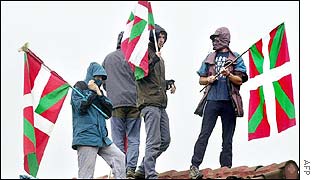
Defiant Batasuna supporters took to the roofs.
The Spanish cabinet has agreed to ask the Supreme Court for a total ban on the separatist Basque party, Batasuna.
The cabinet approved the request on Friday, days after an overwhelming vote in favour of the ban in Spain's parliament.
The initiative would be in addition to the suspension of the party for three years, ordered by Judge Baltasar Garzon on Monday.
Judge Garzon and the government say Batasuna is the political wing of the outlawed armed Basque separatist group ETA.
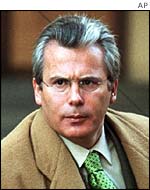
Judge Garzon ordered the clampdown.
Batasuna denies this, but has refused to condemn violence attributed to ETA, including car bombs and the murder of politicians and members of the police.
The Supreme Court is expected to take up to three weeks to announce its decision.
If it upholds the government's call to ban the party, this would be the first time since the death of General Franco in 1975 that a political organisation has been outlawed in Spain.
On Thursday, it was reported that Spain would seek the closure of Batasuna offices in the south of France.
Police have closed at least 12 local Batasuna offices in Spain's Basque region since Tuesday's suspension order.
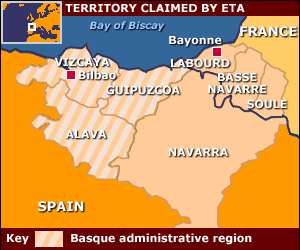
Batasuna says it will appeal against any legal ruling banning the party.
"During the Franco years we faced the same situation, if not worse. We were made illegal, but the pro-independence movement continued," Batasuna lawyer Jone Goirizelaia said.
She said Batasuna would appeal against the government ban once it becomes official, taking their cases to European courts if necessary.
She pointed out a precedent in April when the European Court of Human Rights condemned Turkey for banning a Kurdish political party over its alleged links to terrorist groups.
Under the four-decade dictatorship of General Franco, Basques were subjected to repressive policies that led to the rise of the ETA armed group and Batasuna.
Mr Garzon says he has strong evidence linking the party to ETA, which has killed more than 800 people in its 27-year campaign for an independent Basque state.
|



